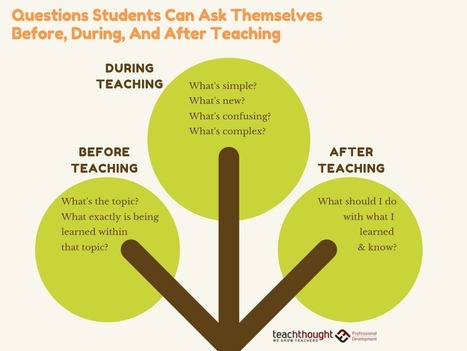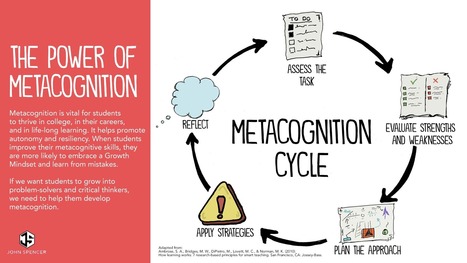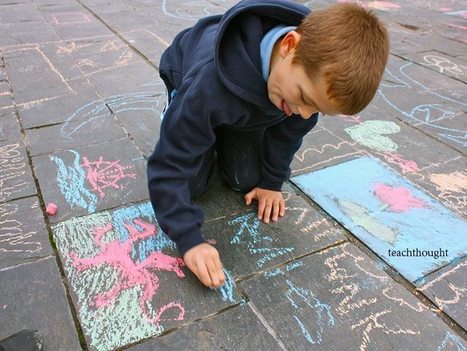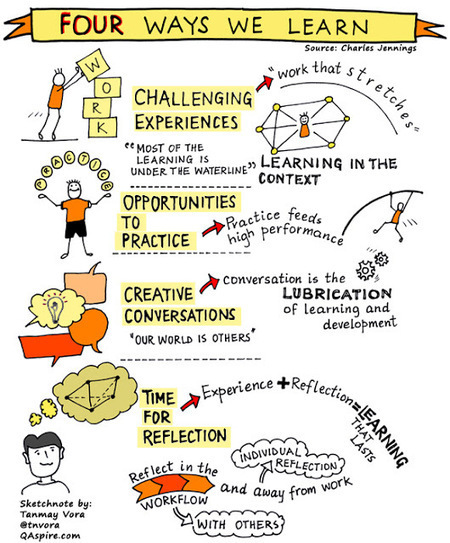 Your new post is loading...
 Your new post is loading...

|
Scooped by
John Evans
|
This page showcases articles, resources and research published from the UKEdChat community about Metacognition.

|
Scooped by
John Evans
|
Are there questions students can ask themselves while you’re teaching? Questions that can guide and support their own thinking and awareness before, during, and after your teaching?
Of course, this assumes you’re ‘teaching’ a traditional ‘lesson’ with a learning objective or target. If not, this may not be very helpful. This is also a list that, like many I’ve done, could get unnecessarily long fast. In some ways, this functions something like a KWL chart. The idea here, however, is less about brainstorming before or after a lesson, but rather having questions useful to guide the student so they can know what to expect.
A few tips to get started:

|
Scooped by
John Evans
|
Amidst the discussions about content standards, curriculum and teaching strategies, it's easy to lose sight of the big goals behind education, like giving students tools to deepen their quantitative and qualitative understanding of the world. Teaching for understanding has always been a challenge, which is why Harvard’s Project Zero has been trying to figure out how great teachers do it.
Some teachers discuss metacognition with students, but they often simplify the concept by describing only one of its parts -- thinking about thinking. Teachers are trying to get students to slow down and take note of how and why they are thinking and to see thinking as an action they are taking. But two other core components of metacognition often get left out of these discussions -- monitoring thinking and directing thinking. When a student is reading and stops to realize he’s not really understanding the meaning behind the words, that’s monitoring. And most powerfully, directing thinking happens when students can call upon specific thinking strategies to redirect or challenge their own thinking.

|
Scooped by
John Evans
|
These days, new ideas about “best practice” in the classroom are published every day. It is an indication that educators are increasingly taking ownership of their own destiny, and with social media making the sharing of ideas so easy, teachers have constant instant access to new and exciting suggestions from around the world.
Though this is exciting, there is an associated danger. The ideas badged as “best practice” are, more often than not, untested in any reliable way. This means that teachers could be implementing practices that do not impact positively. Worse still, they could be having a negative impact on learning.
Perhaps rather than “best practice”, we need to consider “effective practice”. Thankfully, we now have access to a body of research that helps us know what sits in the area of effective practice: the work of the Education Endowment Foundation (EEF) is hugely accessible and allows teachers to see what works, and how much it costs.
Similarly, the work of John Hattie, from the University of Melbourne’s Graduate School of Education, helps us get to grips with what he terms “visible learning” – aspects of teaching that can be seen to makes a difference.
Both the EEF and Hattie cite the development of metacognition in our students as a highly effective approach to securing progress over time. Metacognition is not an instantly easy word to understand – people sometimes glaze over. But in my experience, once it is explained, people “get it", and “want it”. It is a powerful concept that can make a significant difference to our students.

|
Scooped by
John Evans
|
We live in an era where robotics and artificial intelligence will replace many of our current jobs. Global connectivity will continue to allow companies to outsource labor to other countries. Our students will likely change jobs every five to seven years. The corporate ladder is gone and in its place, is a complex maze. They will inhabit a world of constant change. But how do we help students navigate that maze?
We often hear that our current students will work in jobs that don’t exist right now. But here’s another reality: our current students will be the ones who create those jobs.
Not every student will create the next Google or Pixar or Lyft. Some students will be engineers or artists or accountants. Some will work in technology, others in traditional corporate spaces and still others in social or civic spaces. Some of them will work in high-skilled manufacturing. But no matter how diverse their industries will be, our students will all someday face a common reality. They will need to be self-starters and self-managers.
This is why metacognition is so vital. Metacognition happens when students analyze tasks, set goals, implement strategies and reflect on what we’re learning.

|
Scooped by
John Evans
|
Using the right questions creates powerful, sometimes multiple answers and discussions. Aristotle said that he asked questions in response to other people’s views, while Socrates focused on disciplined questioning to get to the truth of the matter.
Ultimately questions spark imagination, conjure emotions, and create more questions. The questions asked by a teacher or professor are sometimes more glaringly valuable than the information transferred to the students. Those questions spark a thought, which leads to a fiercely independent search for information.
If students are the ones gathering that information then they’re the ones learning it and student-driven learning cements lessons into the students’ mind making any lesson more powerful with this strategy. Even though the following list of questions are broken into Mathematics, Literature and Science and Social Science, it’s really just a set of philosophically challenging questions that should be applied to any learning environment.
The questions are unrestricted and open the mind up to unfettered thought, perfect for innovation and understanding. The sections begin with Mathematical Questions because for the purpose of this list they’re the most general and therefore the most useful.
|

|
Scooped by
John Evans
|
Learning how to think about thinking can help students develop strategies for solving problems and understand tasks at hand.

|
Scooped by
John Evans
|
Most educators desire meaningful feedback that can be used as a catalyst for growth. When it comes to improving learning, criticism will rarely, if ever at all, lead to changes to professional practice. Here is the main difference between the two:
Feedback - information about reactions to a product, a person's performance of a task, etc., used as a basis for improvement.
Criticism - the expression of disapproval of someone or something based on perceived faults or mistakes.

|
Scooped by
John Evans
|
The internet is an amazing place filled with a wealth of information. In fact, there is so much information, students must be given the skills on how to search and evaluate in order to utilize the amazing treasures that can be found in an ever running faucet of information. While skilled researchers have developed metacognitive skills in order to prepare for their encounter with their favorite search engine, this is not always the case of students in the classroom. Instead, I wish to discuss the strategies that are important to research before a student enters that first keyword in the research portion. You can find the rest of the 3 part series here: Part 1: Facilitating Inquiry in the Classroom… The Driving Question and PBL Part 2: Facilitating Inquiry in the Classroom… Student Owned Questions… 10 Resources

|
Scooped by
John Evans
|
Metacognition. Neuroplasticity. Retrieval Practice. Amygdala. These aren’t the normal words you’d expect to hear in a 15-year-old rural South African’s vocabulary. Here, though, it’s common talk. And why shouldn’t it be? Over the years, we’ve found youth are innately hungry to learn about the inner workings of their mind—where, why and how learning, thinking and decision-making happens. So, we teach them cognitive science.

|
Scooped by
John Evans
|
Breaking out of the traditional teaching mold isn’t always easy. Training students to think in a different way and recognize the reasons for their own thoughts will help educators focus on teaching lessons rather than individual student thought processes. This approach will help students succeed in your classroom and beyond as metacognition is an important 21st century skill.
|
 Your new post is loading...
Your new post is loading...
 Your new post is loading...
Your new post is loading...




















